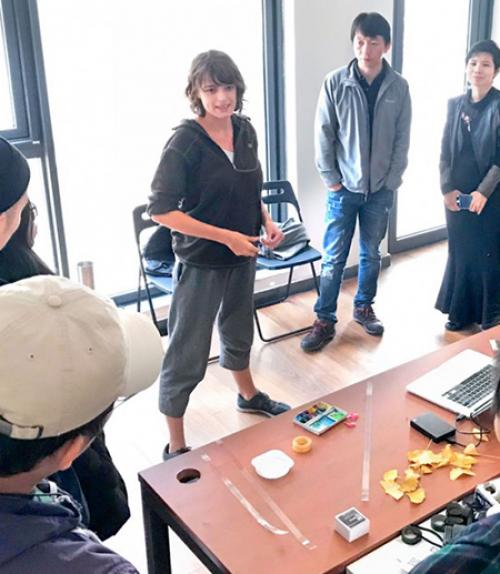When Lisa Malloy ’17 visited China for the first time in 2018, she was amazed by the pervasiveness of artificial intelligence in everyday life.
Her experience fueled her research on the region’s new generation of AI tech workers, which she aims to complete through the Fulbright U.S. Student Program.
Malloy is one of seven Cornell students and recent alumni who received Fulbright U.S. Student Awards to conduct research or teach abroad in the 2020-21 academic year. Despite public health and international travel difficulties due to the COVID-19 pandemic, the awardees still hope to carry out their plans around the globe. Normally at this time of year, Fulbright projects are already under way.
“This year saw 61 highly qualified Cornell students and alumni apply for awards,” said David Holmberg, Fulbright adviser and professor emeritus of anthropology in the College of Arts and Sciences (A&S). “Unfortunately, the Fulbright program is currently suspended until January 2021, when we hope at least some will be able to initiate their awards. Much will depend on the status of the pandemic in the host countries.”
In addition to Malloy, the awardees are:
- Nicole Blumenfeld ’20, A&S; Indonesia, English teaching assistantship;
- Stephanie Enloe, doctoral student, graduate field of sociology; Malawi, “The Politics of Participation: Exploring the Social Context of Farmer Learning in Malawi”;
- Selby Garner ’19, College of Agriculture and Life Sciences (CALS); South Korea, English teaching assistantship;
- Michal Matejczuk ’20, CALS; India, “From My Mother’s Hands, There Cannot Be a Better Pickle: An Ethnographic Study of Achars”;
- Thomas Nolan ’20, A&S; Georgia, English teaching assistantship; and
- Tarannum Sahar ’20, A&S, “Potential of Microhydro Development for Rural Electrification in Lesotho.”
From delays in their expected start dates to ambiguity about visas, Malloy and her cohort have confronted numerous obstacles since clearing the rigorous selection process for the prestigious award. Depending on the U.S. Department of State’s travel warnings, the operating status of host institutions abroad and the availability of flights, this year’s awardees may have different program lengths and experiences.
Malloy has faced two separate hurdles: the pandemic and a Trump administration executive order ending Fulbright exchanges in Hong Kong and China, where she had planned to conduct research.
“It has been distressing for the more than 100 Fulbrighters who have lost the opportunity to do meaningful research in China and Hong Kong,” Malloy said. “I believe the executive order prevents essential cultural exchanges that actually promote American diplomacy.”
Nonetheless, Malloy has been able to find a solution by shifting her research locale, working with the Institute of International Education, which administers the Fulbright Program for the U.S. government. She is currently scheduled to begin work in Taiwan on February 1.
“I am set to conduct research on Taiwan’s unprecedented response to COVID-19 – in large part due to the systematic use of digital social-health infrastructures, which significantly utilize AI,” she said.
Fulbright recently announced a policy change, which for the first time will mean that some Fulbrighters can defer their awards. Now awardees who are not able to begin their research or teaching before the end of July 2021 may defer their grants to the next academic year.
It’s not ideal – but it is cause for optimism, the awardees say.
“It was difficult to wade through all the uncertainties of the pandemic situation,” said Sahar, who plans to develop a prototype microhydro turbine in Lesotho, “but things are looking more hopeful now.”
The Mario Einaudi Center for International Studies administers Fulbright at Cornell, including both the Fulbright U.S. Student Program and the Fulbright-Hays Doctoral Dissertation Research Abroad Program for doctoral students, and provides counseling and support throughout the application process.
Cornell has sent more than 500 students across the globe though the Fulbright U.S. Student Program since the 1940s.
Priya Pradhan ’22 is a writing intern for Global Cornell.




